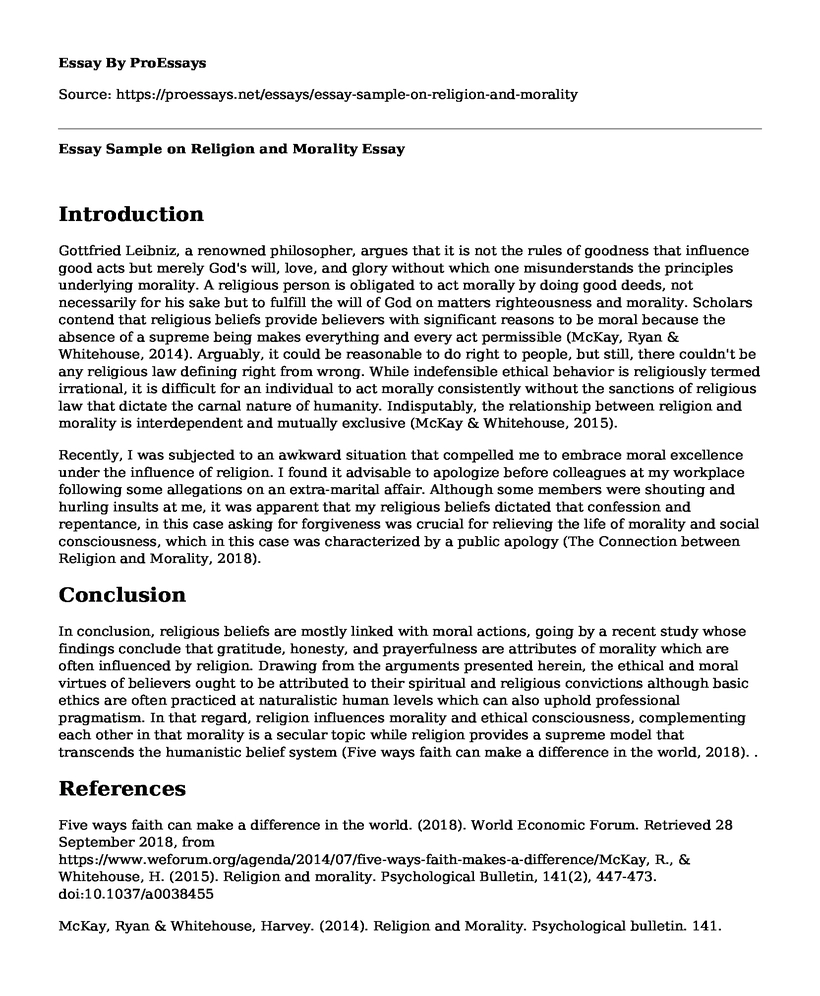Introduction
Gottfried Leibniz, a renowned philosopher, argues that it is not the rules of goodness that influence good acts but merely God's will, love, and glory without which one misunderstands the principles underlying morality. A religious person is obligated to act morally by doing good deeds, not necessarily for his sake but to fulfill the will of God on matters righteousness and morality. Scholars contend that religious beliefs provide believers with significant reasons to be moral because the absence of a supreme being makes everything and every act permissible (McKay, Ryan & Whitehouse, 2014). Arguably, it could be reasonable to do right to people, but still, there couldn't be any religious law defining right from wrong. While indefensible ethical behavior is religiously termed irrational, it is difficult for an individual to act morally consistently without the sanctions of religious law that dictate the carnal nature of humanity. Indisputably, the relationship between religion and morality is interdependent and mutually exclusive (McKay & Whitehouse, 2015).
Recently, I was subjected to an awkward situation that compelled me to embrace moral excellence under the influence of religion. I found it advisable to apologize before colleagues at my workplace following some allegations on an extra-marital affair. Although some members were shouting and hurling insults at me, it was apparent that my religious beliefs dictated that confession and repentance, in this case asking for forgiveness was crucial for relieving the life of morality and social consciousness, which in this case was characterized by a public apology (The Connection between Religion and Morality, 2018).
Conclusion
In conclusion, religious beliefs are mostly linked with moral actions, going by a recent study whose findings conclude that gratitude, honesty, and prayerfulness are attributes of morality which are often influenced by religion. Drawing from the arguments presented herein, the ethical and moral virtues of believers ought to be attributed to their spiritual and religious convictions although basic ethics are often practiced at naturalistic human levels which can also uphold professional pragmatism. In that regard, religion influences morality and ethical consciousness, complementing each other in that morality is a secular topic while religion provides a supreme model that transcends the humanistic belief system (Five ways faith can make a difference in the world, 2018). .
References
Five ways faith can make a difference in the world. (2018). World Economic Forum. Retrieved 28 September 2018, from https://www.weforum.org/agenda/2014/07/five-ways-faith-makes-a-difference/McKay, R., & Whitehouse, H. (2015). Religion and morality. Psychological Bulletin, 141(2), 447-473. doi:10.1037/a0038455
McKay, Ryan & Whitehouse, Harvey. (2014). Religion and Morality. Psychological bulletin. 141. 10.1037/a0038455.
The Connection between Religion and Morality. (2018). Christian Courier. Retrieved 28 September 2018, from https://www.christiancourier.com/articles/411-connection-between-religion-and-morality-the
Cite this page
Essay Sample on Religion and Morality. (2022, Mar 27). Retrieved from https://proessays.net/essays/essay-sample-on-religion-and-morality
If you are the original author of this essay and no longer wish to have it published on the ProEssays website, please click below to request its removal:
- Paper Example on Buddhism in Korea
- Personal vs. Professional Ethics Essay Example
- Humanity and Care for Planet Earth Essay Example
- Essay Example on Aristotle: The Greatest Thinker & His Lasting Impact
- Essay Example on Identity: A Philosophical Analysis of Its Concepts and Relations
- Paper Example on Ethical Decision-Making: Kant and Utilitarianism Perspectives
- The Genetics of Behaviour in Psychology - Essay Sample







